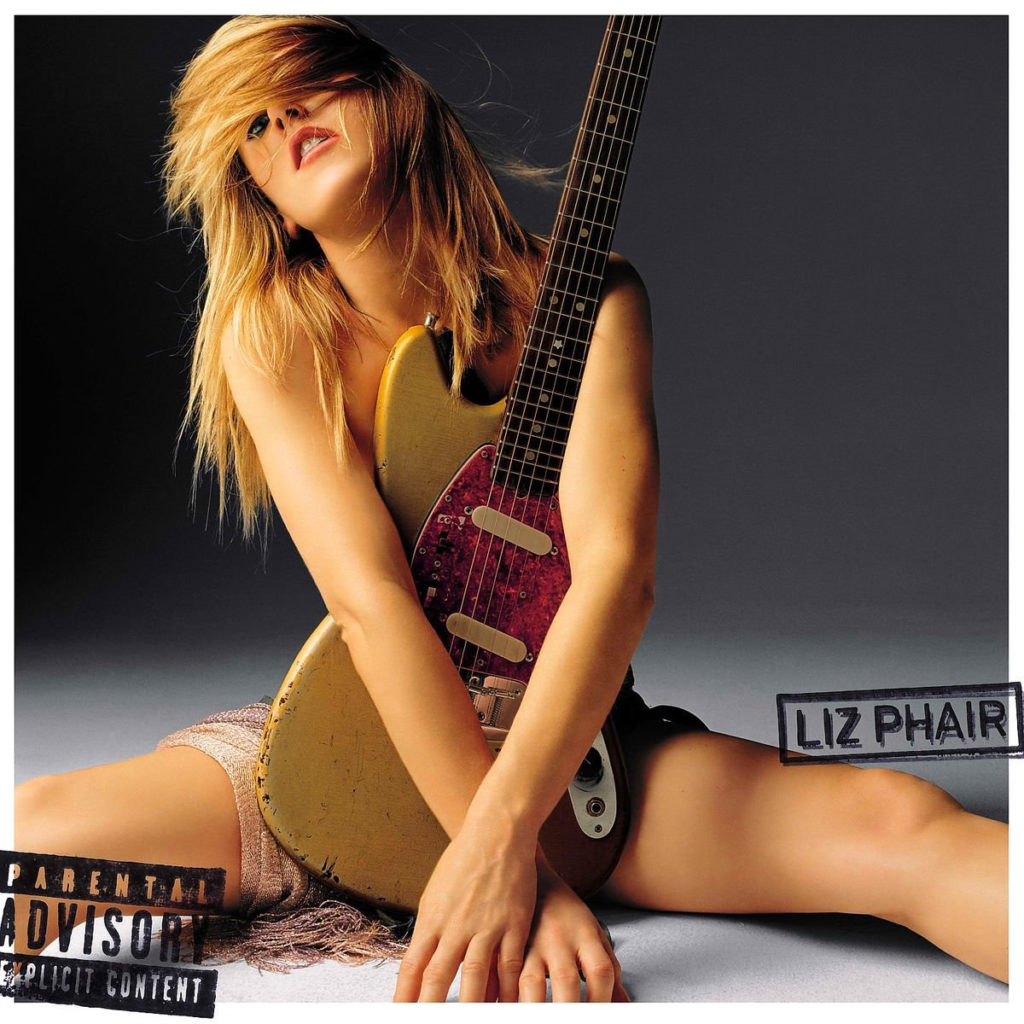By Evelyn McDonnell
The Miami Herald, June 22, 2003
It has been 10 years since Liz Phair first shocked the prudish world of independent rock with the frank sexual confessions of her debut album, the critically acclaimed Exile in Guyville. Maturity has not bred discretion. The singer, now 36, is still speaking her mind, and it’s still, in part, a refreshingly dirty mind, cradled as it is in the blond skull of an upper-middle-class suburbanite.
But what’s most interesting about Liz Phair, her fourth album (in stores Tuesday), are not its Sex and the City moments, such as H.W.C., the ode to male virility whose subject matter is too profane for a family-language newspaper. Instead it’s the tracks that could be theme songs for the Oxygen channel.
Opening song Extraordinary is a self-empowerment anthem for working mothers. “So I still take the trash out/ Does that make me too normal for you,” Phair sings to would-be detractors. In Little Digger, a boy discovers his mother in bed with a man who is not his father. He lines his trucks, except for one, up on the bed to show the man and says, “This one you can’t have/ I got it from my dad.”
“I couldn’t play that without crying the first six months,” Phair says in a phone interview.
Phair has made a career out of laying herself bare with autobiographical tunes, but this time around, instead of writing from the perspective of a slacker chick trying to navigate the male codes of indie rock, Phair is a divorced working mom.
“When I first wrote Little Digger I thought it was a country song,” she says. “I like to listen to country; that’s another one of my dirty little secrets. They have more story in the lyrics.”
Phair is Phair’s first album in five years. Three years ago, after she divorced the father of her 6-year-old son, she moved from the indie heartland of Chicago to its commercial nemesis, L.A. There she worked on Phair with such pop hitmakers as songwriting and production team The Matrix (Avril Lavigne).
SEEN AS BETRAYAL
Many of her old fans see these careerist moves as betrayals of her indie cred. Phair just sees them as work — as some of her most fruitful work to date.
“In L.A., I felt like I could be a normal working adult and keep work as part of my normal daily life,” she says. “It’s easier for me to do what I do and be a mom out there.”
Working with The Matrix, a trio that includes former recording artist Lauren Christy, pushed Phair in new directions.
“The Matrix gave me really amazing vocals, melodies that I wouldn’t have thought of on my own that are phenomenal to me,” Phair says. “Lauren, because she’s my age and a mom and was a pop star, it could have been a total clash; instead it was a really exciting and exhilarating collaboration. We really understood each other. Mostly I’d collaborated with men until then. She pushed me vocally to do stuff I didn’t know I could.”
FEMINIST BOND
Phair has also been criticized for the continuing sexual content of her lyrics, as if a 36-year-old woman no longer has a libido. “The moves that seemed sexy when a girl got carded can feel distasteful in adulthood,” a Blender magazine critic wrote. It’s criticisms like that, and the music press’ increasing resemblance to skin-obsessed men’s magazines like Maxim, that make Phair even more of a feminist than she was in the ’90s.
“When I was working with The Matrix, Lauren and I would flip through magazines and we’d both be like, ‘Look at this, how many clothes can she take off? Who can be more the slut?’ We all want to look sexy; we’re old, we want to look hot. But you took a look at the overall trend and you realize there are other forces at work in why you think that’s sexy.”
She and actor Robin Tunney have even considered penning a feminist handbook for young girls. “A lot of young women take freedoms and advances for granted and don’t know what was fought for. We’re taking things for granted as a gender that you can’t take for granted. They weren’t there 100 years ago and they could be gone 100 years from now.”
Is this the same Phair who ingratiated herself with male critics and fans by singing about her oral skills and posing on the cover of Rolling Stone in a slip?
“I am now an adult and I look at young women and I feel protective,” Phair says. “I want young women to feel powerful and in control and make decisions based on what is really good for them because they know themselves well enough to feel what is good for them. I spent lot of my early days doing things so that guys would like me. I want women to feel not damaged inside; I want them to feel strong.”
LOST MASTERS
Phair had hoped to release a 10-year anniversary edition of Guyville, but her former indie label, Matador, lost the master tapes, she says. (A spokesman for Matador says the label gave the masters, as well as duplicate copies, to Capitol. Capitol couldn’t be reached for comment.) That’s part of why she feels no allegiance to indies, and has been working the corridors of her major label, Capitol, hard.
“I’m trying to kick my way back in, frankly, because after I had my baby I felt marginalized: ‘She’s that chick who did the Guyville record.’ Part of it is just me being desperately like, ‘Hey, hey, hey, hey, hey, hey, wait, hold the train!’ The difference for me is I record music now largely — and I did with Guyville too and I think [1994’s] Whip-Smart and [’98’s] whitechocolatespaceegg were different — to please myself. Because as a mom my priorities in life shifted. He’s so much the center of what I think is important. When I make music now I don’t worry about people thinking it’s cool or not.”
Pop effort has its peaks

Liz Phair
Liz Phair (Capitol)
3 stars
Liz Phair wants to have her cake and eat it too. “I am just your ordinary, average, everyday sane/psycho supergoddess,” the alt-rock heroine sings in a string of contradictions on the first track of her fourth album (in stores Tuesday).
Phair wants to be a pop star, as the album’s big studio sound and soaring choruses, courtesy top 40 hitmaking producers and songwriters Michael Penn, R. Walt Vincent and The Matrix, shows. But she also wants to be a renegade, the bad girl of dirty ditty H.W.C. and Rock Me, her ode to a younger man.
She wants to be the fishnet queen of Guyville, the site of her first album, but she also wants to be a mom. And there’s no reason she can’t be all these things: smart and popular, Madonna and whore. Except she may not have quite the confidence, and America may not quite be ready.
One thing’s for sure: Phair sounds better than ever. Maybe it’s just modern technology, but the woman who warbled off-pitch on her debut has a lovely command of pitch on songs like Little Digger; it’s the most miraculous maturation of a singer this side of Madonna.
Unfortunately, not all the arrangements do her justice. The striving for an airwave-friendly sound gives the tracks a sing-song sameness. Even tunes with typically Phairesque quirky themes, such as Favorite, in which she compares a lover to underwear, are made bland by predictable crescendos and pianissimos. Sometimes it seems that Phair doesn’t trust her material to shine on its own. Which leaves many tracks here instantly forgettable.
It’s too bad, since Phair is a skilled storyteller with a knack for picayune detail and imaginative fancy. “Down on the Lower East Side/ In the dirtiest apartment you could find,” she starts It’s Sweet, one of several songs in which the singer, recently divorced, rediscovers eroticism. She’s returning to Guyville older, wiser but still horny.
“You don’t even know who Liz Phair is,” she marvels to her young lover on Rock Me. She’s both peeved and relieved to not have to live up to her name. Having her cake and eating it, too.
Featured Image: Liz Phair in 2003 (Photo: Phil Poynter)






